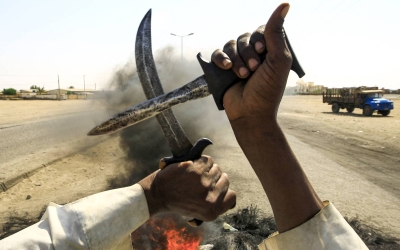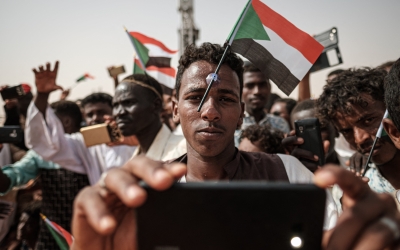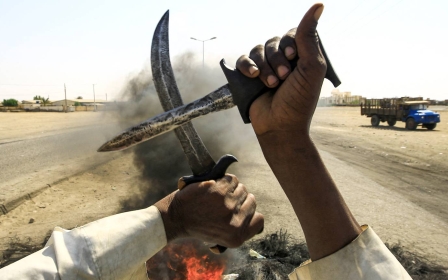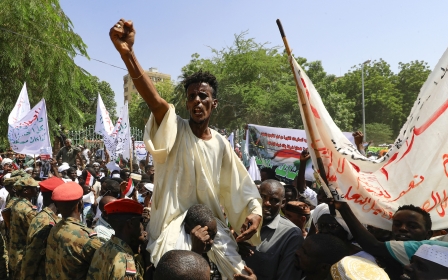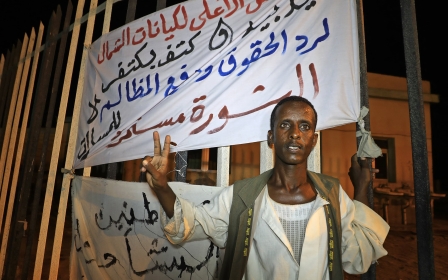Sudan: Facebook shuts down fake accounts amid public debate online
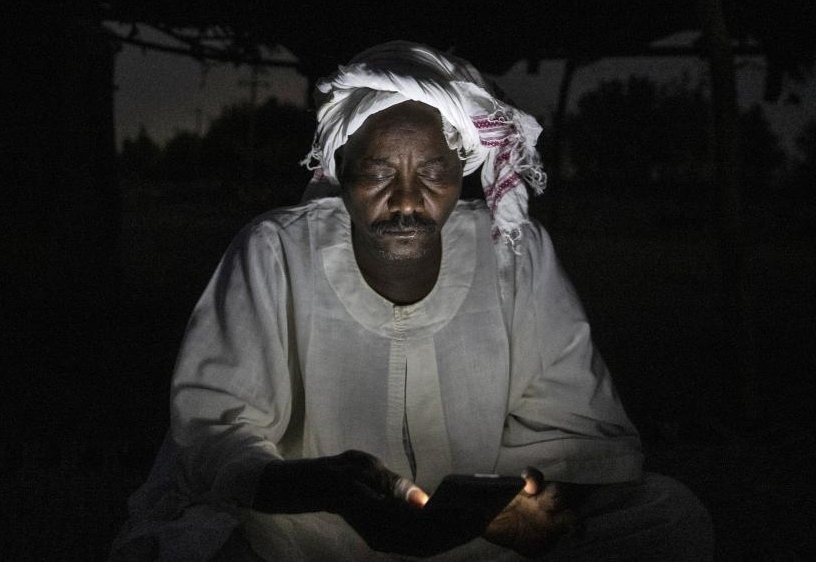
Facebook said on Wednesday that it shut down two networks of fake Sudanese accounts, as public debate about the power-sharing agreement between the military and civilian leaders in Khartoum continues online.
The online crackdown comes amid an economic crisis and political tensions over Sudan’s transition to democracy, following former President Omar al-Bashir’s fall from power after a popular uprising in 2019.
New MEE newsletter: Jerusalem Dispatch
Sign up to get the latest insights and analysis on Israel-Palestine, alongside Turkey Unpacked and other MEE newsletters
Facebook said one of the networks was linked to the Rapid Support Forces (RSF) paramilitary group. Researchers hired by the civilian government said the other network was made up of Bashir supporters pressing for a military takeover.
Hundreds of protesters have set up camp in front of the presidential palace this week in a bid to pressure the military to take control of the country.
Facebook shut a network of almost 1,000 accounts and pages with a total of 1.1 million followers, which it said were run by people linked to the RSF.
The network of fake accounts has popularised online content and narratives related to the RSF militia, led by deputy head of the ruling Sovereign Council, General Mohamed Hamdan Dagalo. Some Sudanese see the militia general as a leading figure behind moves to remove the civilian part of the governing coalition.
Dagalo has previously denied any wish to seize political power and expressed his commitment to Sudan’s democratic transition.
Representatives of the RSF and Dagalo did not respond to requests for comment from Reuters about their involvement in the fake accounts network.
The network was identified through Facebook’s own mechanisms of investigation, David Agranovich, the company’s director of threat disruption, told Reuters.
Bashir loyalists working to 'tarnish' government
Facebook removed a 100-strong online network of accounts linked to Bashir loyalists last June after it was tipped off by Valent Projects, a company hired by Sudan’s Information Ministry to look into online disinformation. The network had more than 1.8 million followers.
Bashir loyalists were “working systematically to tarnish the image of the government”, the ministry told Reuters following the posts identified by Valent Projects.
Facebook determined that the posts were disingenuous and seemed like news media, but in fact offered skewed coverage of political events.
An estimated 30 percent of Sudan’s 45 million population has internet access. Those Sudanese rely on social media for news.
The power-sharing agreement between civilian and military leaders has been pushed to breaking point in recent weeks, following what authorities called a failed coup attempt.
Bashir loyalists and military leaders have been accused of stirring up public opinion against Sudan’s democratic transition, but they have denied any involvement in preventing the transition from running its course.
Valent Projects said that Facebook’s approach to targeting disinformation collectives only relies on analysis of content, despite Facebook saying it also uses technical signals to identify the networks.
The network Facebook identified is actually three times larger and attracted a growing number of more than six million followers, said Valent.
It was active this week as protests took over Khartoum and last month following the coup attempt, Valent Projects representatives told Reuters.
"It looks like they were trying to give the impression of grassroots support for such a move," the company’s director, Amil Khan, told Reuters.
Encouraging civil disobedience
Posts included accusations that Prime Minister Abdalla Hamdok is not Muslim or that he paid his staff in dollars, allegations Hamdok previously denied.
Others called for the return of Bashir, who is currently in prison following charges of corruption and war crimes in the Darfur conflict.
Posts also encouraged civil disobedience in the Eastern Sudan region, Valent Projects head of research Zouhir al Shimale told Reuters.
"People in Sudan thought there was just going to be a massive demonstration because they saw so much activity," Khan, Valent director, told Reuters, citing a movement called Akhtona – Get out of the way – in local Arabic dialect. In the end some 3,500 people showed up.
The information ministry said the government is committed to “protecting freedom of expression”, but that it hasn’t taken any legal measures against administrators of the accounts and pages.
Three admins of Facebook pages contacted by Reuters denied being part of a disinformation network.
Facebook previously announced two other takedowns, in December 2020 and May 2021, which targeted similar accounts that supported Dagalo and the RSF, according to researchers at Stanford Internet Observatory and the Atlantic Council's Digital Forensic Research Lab.
Facebook’s Agranovich said the most recent network, which they linked to the RSF, did not have any foreign connections and seemed to be a purely domestic influence operation.
Middle East Eye delivers independent and unrivalled coverage and analysis of the Middle East, North Africa and beyond. To learn more about republishing this content and the associated fees, please fill out this form. More about MEE can be found here.


